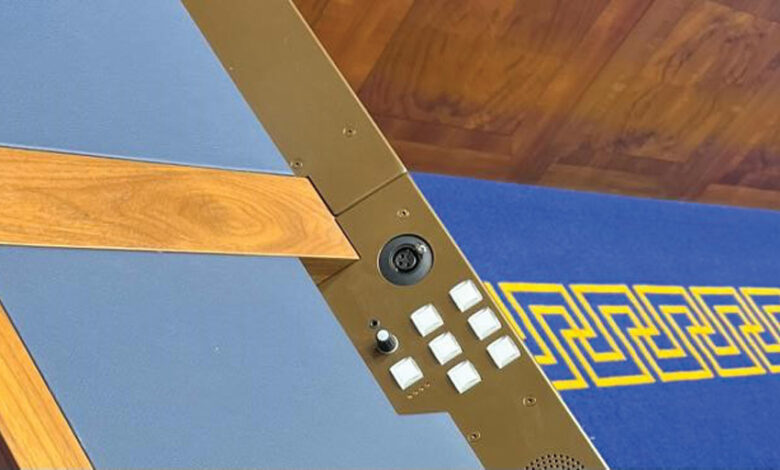Assembly chamber ‘future-proofed’ for electronic voting

The Northern Ireland Assembly Commission has said that no decision has been taken to install an electronic voting system in the Assembly chamber, despite the addition of enabling infrastructure.
The Assembly Commission says that panels and cables provided during recent upgrade work “would facilitate the implementation of electronic voting if a decision to implement such a system is taken in the future by the Assembly”, but that an electronic voting system has not been installed.
As of October 2023, over £1.5 million has been spent on a work programme, approved by the Assembly Commission in November 2021, to upgrade ageing video and audio systems in the Assembly chamber.
In a detailed list of work carried out in two phases over summer 2022 and summer 2023, the Assembly Commission does not mention electronic voting infrastructure, but does point to “technical furniture” used to house broadcasting standard digital sound systems, incorporating modern microphones, loudspeakers, and digital processing units.
Responding to a written question by TUV leader and North Antrim MLA Jim Allister querying when the decision to implement electronic voting had been taken, the Assembly Commission said: “The Assembly has not decided to install an electronic voting system and one has not been installed.
“In November 2021, the Assembly Commission approved a business case to upgrade the audio and video systems in the Assembly chamber, which included consideration of inputs (e.g. cabling and panels) to potentially facilitate electronic voting. During 2022 and 2023, the Assembly Commission implemented an extensive programme of work to upgrade the audio and video systems in the Assembly chamber, together with associated works.
“This programme of work did not include the installation of an electronic voting system, however panels and cabling have been provided that would facilitate the implementation of electronic voting if a decision to implement such a system is taken in the future by the Assembly.”
The outbreak of the pandemic forced all legislatures across the globe to assess their electronic and remote voting capability in relation to the capability of the continuation parliamentary business. In Northern Ireland, temporary provisions in Standing Orders were introduced to allow proxy voting, potentially because unlike some neighbouring legislatures, the Northern Ireland Assembly did not have an electronic voting system in place to allow for expansion of the system to facilitate digital remote voting.
Assessing the use of electronic and remote voting in other jurisdictions, the Committee on Procedures concluded in 2022 that the scale and scope of any potential preferred system for electronic voting at the Assembly was a significant piece of work that it would not be able to complete in the time remaining in the mandate. It added that issue should be added to the potential topics for consideration by a successor committee.
However, following the end of the mandate, while no new Executive or Assembly has been formed, new infrastructure in the Assembly chamber has been put in place.
“The scope of any electronic voting system will be a matter for the next Assembly Committee on Procedures to consider and for the Assembly to agree,” the Assembly Commission says.
“While electronic voting systems are not currently a feature in the Assembly chamber, the most recent work has provided an element of future-proofing for the needs of the Assembly in the years ahead. This should ensure a smoother transition, should a decision be taken to introduce electronic voting, by reducing the level of infrastructure work required and the associated costs.”





